
Community members on May's garden work day. (Photo by Gisselle Palomera/CALÒ News)
For nearly two decades, an organization in the heart of South Central Los Angeles has worked to create food systems that are inclusive and healthy, as well as provide a green space where people are incentivized to care for the land and build a more resilient urban landscape in one of the most populated, crowded cities in the nation.
RootDown LA was founded in 2007 by a small group of driven youth leaders from Manual Arts High School in South Central L.A., with the belief that people could easily and affordably incorporate fresh and whole foods into their busy daily lives.
The force behind the organization came from youth and food justice advocates who realized that the current nutrition education in their community wasn't working. Together, alongside co-founder Megan Hanson, they set out to develop programming that would get people excited about healthy food.

Karen Ramirez, executive director of RootDown LA. (Photo by Gisselle Palomera/CALÒ News)
Karen Ramirez, executive director of RootDown LA, said this work is even more critical in communities like South Central L.A., where the standard American diet often leaves out vegetables and fruits and relies on processed, chemically and additive-infused foods.
“We get kids and adults to eat their veggies, and we do that by doing two things. We build demand and supplies of healthier food by showing them quick, simple techniques that transform what they believe to be nasty veggies into very good-tasting food and we also build the supply side of things by growing [fruits and vegetables] immediately here in our community,” she said.
Located in South Central, George Washington Carver Middle School is home to RootDown LA’s KitchenPOD concept, where fruits and vegetables travel from the soil to an outdoor kitchen to feed community members. RootDown LA established roots in Carver Middle School in 2018.

Community members beautifying the garden. (Photo by Gisselle Palomera/CALÒ News)
Since then, the organization has beautified, expanded and brought to life a garden in a space that had been completely dormant. In George Washington Carver Middle, RootDown LA is growing approximately 1,000 different plants, 80 trees, including 16 apple trees, 10 olive trees, seven clusters of banana trees and three grape vines, among others. The garden is also home to about 300 sunflowers.
Additionally, the garden is home to medicinal and ancestral plants like salvias (such as white, black, and purple sage), yerba santa, yerba manza, wild rose and rosemary, as well as fruits, herbs and vegetables like berries, corn, squash, cilantro and apples.
“In the fall of 2018, we got invited through the principal that was here during that time. We got very excited because this garden was dormant; there was nothing happening here,” Ramirez said.

Community after working at the garden. Photo by Brenda Verano/ CALÒ News)
Due in large part to a lack of grocery stores, farmers markets and healthy food providers, areas such as South Central L.A. are classified as food deserts, which are areas that lack fresh fruit, vegetables and other nutritious whole foods, according to the U.S. Department of Agriculture. I
n communities like these, where the majority of people are Black and Latino, fast food restaurants and liquor stores are in flux.

(left) Blanca Alvarado, lead culinary instructor and (right) Karen Ramirez making food for community members. (Photo by Gisselle Palomera/CALÒ News)
In 2018, Alice Tiffany from Loyola Marymount University in L.A. examined South L.A. and its food supply. Her research revealed that the community had a low density of grocery stores and a high density of corner and convenience stores, as well as fast food restaurants. As her research concluded, 94% of food retail outlets in South L.A. were found to be convenience stores or corner and liquor stores. It also showed that in the neighborhood, there were 12.5 times more fast food restaurants than grocery stores.
In recent times, food justice advocates have steered away from using the term “food desert” and advocated for a shift to "food apartheid," arguing that food access, unlike a desert, which is a natural phenomenon, stems from deliberate systemic and discriminatory disparities as well as historical injustices like racism, segregation and economic inequality.

Community members beautifying the garden. (Photo by Gisselle Palomera/CALÒ News
“To have this in the middle of South Central is amazing, as we don’t have many open and inviting spaces like this one. Another [of my favorite things] is seeing the fruits of your labor after coming so constantly and doing some of the planting and coming a month later and then seeing all of it bloom. It's very rewarding,” Veronica, a South L.A. community member who volunteers at the garden regularly, told CALÓ News.
More than just sharing healthy recipes with the community, the organization also has an educational component to it. Through community service projects, mentorship, networking opportunities, first job experiences and workshops, RootDown LA also educates community members on nutritional education, supporting local food systems, promoting sustainable agriculture, advocating for policies and more that protect food access and workers' rights.
“At RootDown LA, our motto is a youth-driven neighborhood food system and reinventing what food systems look like. We talk about food justice and why people are eating more unhealthy foods than healthier foods in our communities. We look at food apartheid and food deserts,” Ramirez said.

The garden is also home to a multigenerational community and volunteers. (Photo by Gisselle Palomera/CALÒ News)
Every last Saturday of the month, RootDown LA hosts what they call “Garden Work Days” at the Carver Middle School garden, where community members of all ages garden, learn more about where food comes from and connect with other food growers.
“Every last hour of the month, we have community open events for the community members to just come in and help out, either just beautify [or] revamp certain sections [of the garden] to bring them back to life by adding more flowers or adding new plants into the garden,” Andres Chopin, garden manager, told CALÓ News. “As of today, we are doing more revamping, [including] cleaning out our insectary and our teaching areas and then adding new patches of flowers.”
In addition to gardening, these Saturdays also offer a range of workshops from composting to meditation and even how to use and work with hemp. The once-a-month event is open to all and no gardening experience is needed.

Andres Chopin, garden manager at RootDown LA, alongside other volunteers. (Photo by Gisselle Palomera/CALÒ News)
Chopin began cooking with RootDown LA during high school. He later became a culinary instructor, teaching other kids about the many ways to cook vegetables and has seen the transformation of the garden in the last seven years.
Greeting every one of the volunteers, walking sometimes even barefoot throughout the different plants and with a big smile is how you can find Chopin in the garden—a place that he has seen and helped transform in the last seven years.
He said the half-acre plot of land houses thousands of sustainable organic pesticide- and herbicide-free vegetables and plants such as Korean zucchini, white-stripe pumpkin and blue corn. “We like to have this symbiotic relationship between nature itself and the things that we grow throughout [based on] Southern California weather. All the veggies and produce that we grow here are completely free for the community. Then all of those go back again to our community,” he said.

Ingredients previously harvested from the garden to make a vegetable chili. (Photo by Gisselle Palomera/CALÒ News)
Last weekend, CALÓ News visited the RootDown LA site and community garden, where Blanca Alvarado, the lead culinary instructor for the organization, was using the ingredients previously harvested from the garden to make a vegetable chili that would feed the dozens of volunteers who attended. “All these greens that I have cut here came from the garden,” she said.
Alvarado, who is also a small business owner selling healthy aguas frescas in her community, said she is very intentional about the ingredients and added sugars she adds to the food she makes for the community, knowing that many of them, mostly Black and Latino, suffer from maladies like diabetes, high blood pressure or other health complications.
Youth empowerment is also an important part of the organization's efforts. The garden is situated in the city's 9th Council District, which is home to roughly 77,957 people between the ages of 10 and 24—10% of the city's total youth population.
According to the Invest in Youth Coalition, South Central L.A. has one of the highest levels of disconnected youth, which, as defined by the coalition, are young people who are not enrolled in school, are not high school graduates and are either unemployed or not in the labor force.
Ramirez said this is what makes spaces like those cultivated by RootDown LA more important and essential than ever.

Every last Saturday of the month, RootDown LA hosts what they call “Garden Work Days.” (Photo by Gisselle Palomera/CALÒ News)
“If a student from a high school or middle school wants to do some community or service learning hours, they're more than welcome to come and do it with us,” Chopin said.
Ruben Figueroa, 25, is an intern for RootDown LA, helping Chopin maintain and manage the garden. As a youth who grew up in government-assisted housing at various times in his life. Working at the garden has been a positively impactful experience.

Ruben Figueroa, 25, is an intern for RootDown. (Photo by Brenda Verano/ CALÒ News)
“I never had a space like this growing up and that's something I always felt I was missing in my life,” he said. “Growing up, I lived in government project buildings and you don't have a backyard there. Usually the center plaza is your backyard, but when you're packed and confined with a bunch of households dealing with mental illness and substance abuse, it's hard to have a safe space outdoors, even like just going outside and [taking] a deep breath of air.”
Since taking on food justice and gardening work, Figueroa said he has found a new passion, especially in the ways he has seen community caring for and loving a garden like the one in South Central L.A.
“Working here just feels like it heals me a little bit and getting to see different people in the community come together and share a good day under the sun has always been my dream, and that's something that I look forward to doing in the future,” he said.

Community members on May's garden work day. (Photo by Gisselle Palomera/CALÒ News)
Ramirez hopes to expand the RootDown LA services across other underserved regions in L.A.
She said today, more than ever, she hopes city and county leaders are committed to investing in green spaces and recreational places that, as she mentioned, can be life-changing.
To learn more about RootDown LA, visit https://www.rootdownla.org/.

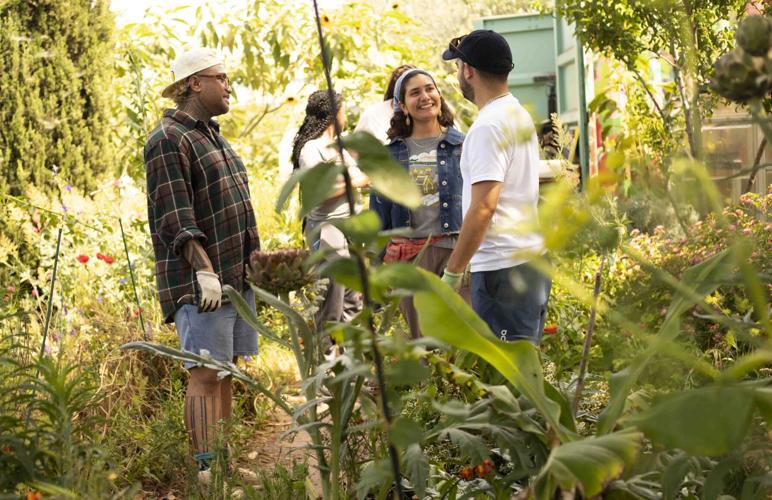
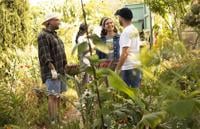

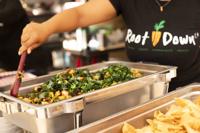

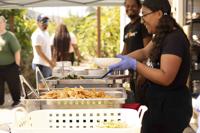

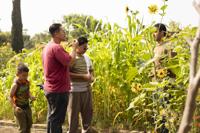

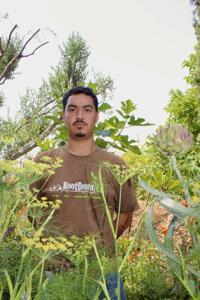

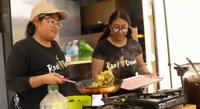

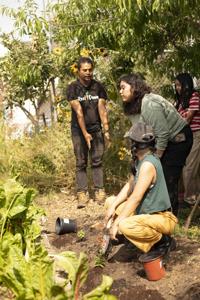

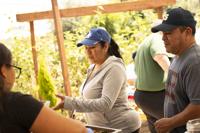

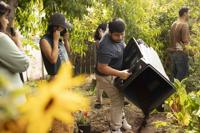

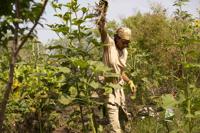

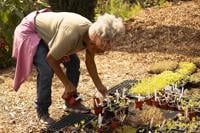

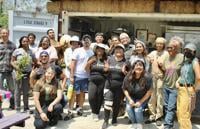

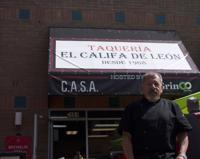

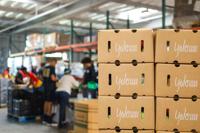

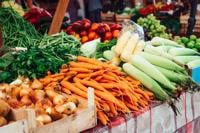




(0) comments
Welcome to the discussion.
Log In
Keep it Clean. Please avoid obscene, vulgar, lewd, racist or sexually-oriented language.
PLEASE TURN OFF YOUR CAPS LOCK.
Don't Threaten. Threats of harming another person will not be tolerated.
Be Truthful. Don't knowingly lie about anyone or anything.
Be Nice. No racism, sexism or any sort of -ism that is degrading to another person.
Be Proactive. Use the 'Report' link on each comment to let us know of abusive posts.
Share with Us. We'd love to hear eyewitness accounts, the history behind an article.